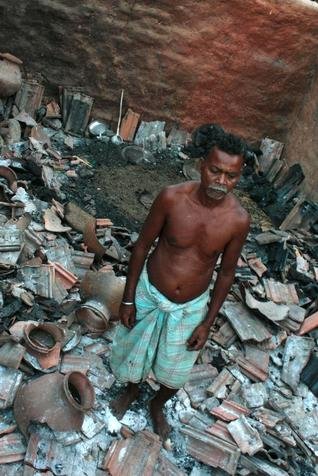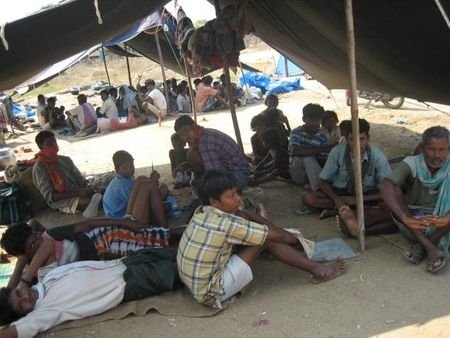Chhattisgarh: Salwa Judum Founder Among Many Killed in Maoist Attack (Outlook India)
“At least 17 people, including senior Congress leader Mahendra Karma, were killed and former union minister V C Shukla and 19 others injured when heavily-armed Maoists ambushed a convoy of party leaders inside a dense forest in Chhattisgarh’s Bastar district.
“Karma, a former home minister of the state, who was a guiding force behind ‘Salwa Judum’ (anti-Naxal operation by vigilante groups), was surrounded by about 100 to 150 Maoists who peppered his body with bullets.
“The Maoists also kidnapped PCC chief Nand Kumar Patel and his son Dinesh after attacking the convoy of Congress leaders in Darba Gati Valley near Jagdalpur, headquarters town of Bastar district, police said.”
See also:
Mahendra Karma and his cynical form of vigilantism by Sudeep Chakravarti (live mint/The Wall street Journal, May 28, 2013):
“Salwa Judum vigilantes destroyed homes, and stores of grain and any other food they had; killed dozens of men, women and children; maimed and—or—raped several. Children were forced to watch the death and dismemberment of parents. Pregnant women were disembowelled. The death and torture of those suspected of allying with Maoist rebels was instant. This intimidation, blessed by posses of state police and Union government paramilitaries who have their own record of blood, lust and war crimes in the region, at one point herded in excess of 50,000 tribal folk into little more than concentration camps across Dantewada district—since last year further split to create the additional districts of Bijapur and Sukma.
“To be fair to Karma, there was a method to his madness. Maoists had begun to infiltrate the Dantewada region as far back as the 1980s—it was then part of the vast Bastar district of the undivided Madhya Pradesh—to establish what would later enlarge into the rebel-influenced Dandakaranya zone. Landlords such as Karma, himself a child of a tribal landed family, increasingly began to see left-wing extremists, then spearheaded by the vanguard of the Communist Party of India (Marxist-Leninist) People’s War, as a threat. The perception was mutual.
“For the rebels, Karma and his ilk symbolized the class enemy—worse, a tribal who came from traditionally, socio-politically oppressed stock was the class enemy of fellow tribal folk. For Karma & Co., the stealthily and rapidly infiltrating rebels represented a threat in several ways. For one, at the barrel of the gun they could redistribute land to the landless. For another, they were a direct threat to the local practice of Malik Makbuja, the right of the Adivasi to cut trees on his own land that had been subverted to benefit middlemen and various vested interests.”
And see:
The war in Bastar (Frontline, June 29, 2013):
“The CPI (Maoist) has grown in strength in Bastar primarily because of three factors. One, it fought alongside the Adivasis against the local contractors and ensured that the contractors paid the Adivasis the minimum wages for tendu leaf (used for bidi manufacturing) collection, the main source of income for the Adivasis. It also helped people out of the exploitative Maalik-Makbuja bonded labour system in timber felling. Two, it organised people against the excesses of forest officials who took them for a ride. Three, through force, it distributed the lands of the malguzars (feudal lords) to landless Adivasis.
“Karma came from a feudal Manjhi family. He was one of the tribal landlords in the area who, like many other landed people, turned against the Maoists in the 1980s. Because of the land distribution process, initiated forcibly by the Maoists, Karma had always been working to form an alternative front that could fight the Maoists. Therefore, he developed strong associations with big businesses and feudal lords from across party lines. He supported land acquisition by the government, conducted Jan Jagaran campaigns against the Maoists, and advocated industrialisation and mining activities in Bastar. Because of such activities, many Congress leaders too were against him.
“In the early 2000s, he founded a group called Salwa Judum (Movement for Peace), ostensibly as a Gandhian movement. But it went on to appoint landed Adivasis as ‘special police officers’ (SPOs) and became a militant force. The State government used the Judum to its advantage as the SPOs helped the security forces in navigating the dense forests. Various civil rights groups strongly opposed the organisation. Many official and unofficial reports claimed that it displaced about 50,000 people from their villages and destroyed 650 villages in the area. Activists claim that constant plundering, torching of villages, rapes and killing of innocent Adivasis became a norm in Bastar. Salwa Judum was disbanded following a 2011 Supreme Court decision that declared the organisation ‘illegal and unconstitutional’.”


